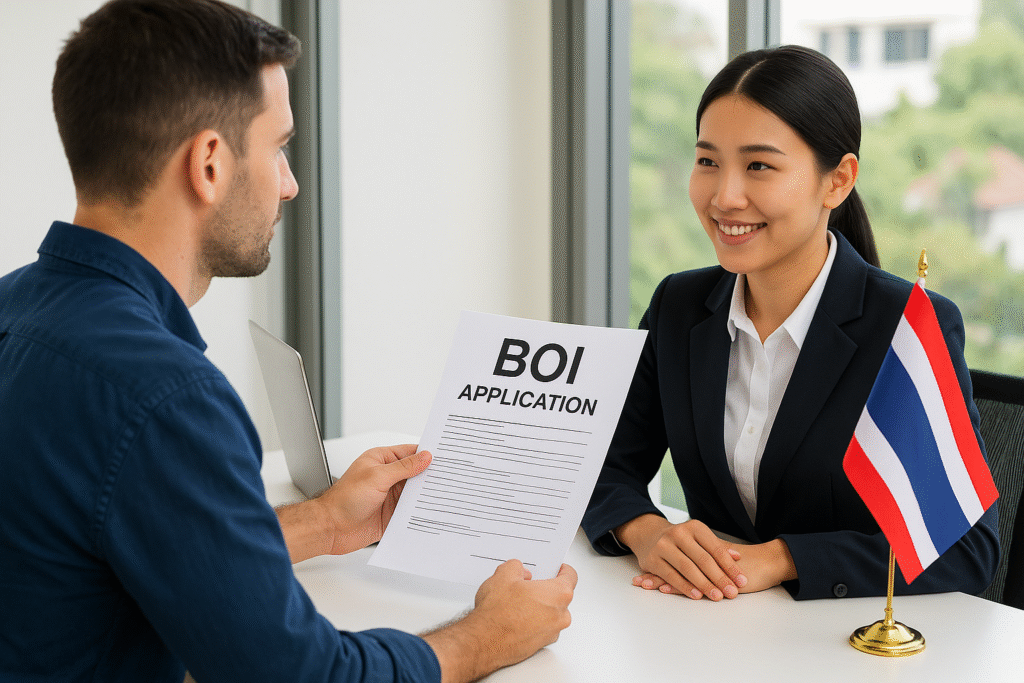Securing Thailand’s Board of Investment (BOI) promotion is one of the most effective ways to benefit from reduced restrictions and strong incentives for doing business in Thailand. However, many applicants face refusals or lose benefits due to avoidable mistakes in their applications or post-approval reporting
This article explains why BOI applications get declined, how to prepare a strong application, and how to stay compliant after approval.
Common Reasons for BOI Application Refusal and How to Avoid Them
Strong BOI applications share one trait: alignment. When your business model, documents, numbers, and narrative all point in the same direction, approvals come faster. When they don’t, the process stalls. Here are the most common, avoidable reasons BOI applications get rejected and how to fix them before you submit.
1) Misaligned BOI Category
The most frequent cause of rejection is attempting to “fit” into a promoted activity that doesn’t reflect their real business model. If reviewers can’t clearly connect your operations to the category’s scope and intent, rejection is likely.
How to fix it: Start with an honest description of your core revenue-generating function that provides national value such as technology, skills development, exports, or regional impact. Then, position your project under the BOI category that closely matches this activity even if it means refining or phasing your project to focus on core activities.
2) Unfocused or Generic Business Plan
The BOI evaluates feasibility and national impact, not a standard business plan. They want clarity, economic relevance, and measurable contributions to Thailand’s national goals.
How to fix it: Replace broad generalities with detailed information including workflow, compliance to standards (quality, safety, data protection), equipment and platform specifics, workforce planning (Thai employment plans by role and timeline, upskilling programs), and measurable outcomes (export targets, technology adoption, local supplier development). Financial figures such as capital expenditures, hiring, duty relief, and tax estimates should be coherent and consistent.
3) Insufficient Capital or Ineligible Investment Sources
Applicants often misread what qualifies as investment and underfund the project. Items like land and routine operating cash usually don’t count toward minimum investment thresholds; equity shortfalls sink otherwise strong cases. Issues arise when companies do not clearly demonstrate paid-up equity proportional to initial project phases or rely on ineligible funding sources.

How to fix it: Show detailed sources and timing of capital injections aligned with equipment purchases, setup, and commissioning. Maintain sensible equity-to-debt ratios consistent with your cash-flow reality to avoid queries and delays.
4) Underprepared Clarification Meetings
The clarification meeting is a feasibility review, typically with a panel of officers focused on process details, Thai employment and training, risk management, and the rationale for choosing Thailand.
How to fix it: Prepare a concise, well-structured deck tied directly to your submitted file. Rehearse answers on unit economics, market entry, risk controls, compliance, and Thai workforce development. Ensure appropriate personnel attend (technical experts for systems details, finance for numbers), keep presentation materials concise, and bring supporting documents such as quotations, training matrices, and certification plans.
Confidence backed by specifics matters. A strong clarification meeting sets the tone for clean, consistent filings afterward making your BOI reporting in Thailand far simpler to manage.
5) Missing, Incomplete, or Conflicting Documents
Small inconsistencies, like mismatched headcount, activity descriptions, site conditions, or licenses slow down approvals or cause outright rejection.
How to fix it: Thoroughly review all documents to ensure consistency and confirm that project sites are ready for inspection and fully aligned with your stated project scope.
Characteristics of a "Ready-to-Approve" BOI Application
An application that moves quickly through review allows examiners to follow every stage of the project from initial purchase orders to first revenue without any guesswork. Key features include:
- Activity descriptions using BOI’s official terminology
- Detailed process and technology explanations down to parts and service protocols
- An itemized and scheduled list of eligible investments
- Premises that are inspection-ready
- Detailed Thai staffing plans specifying roles, seniority, and training content
- Coherent duty relief plans with aligned item lists and timelines
- Financial figures and documents that match exactly across all attachments
Including a concise annex to explain which external standards apply (quality, safety, data protection) and how compliance will be demonstrated can reduce review cycles.
What to Expect at the Clarification Meeting
- Format: Panel session with 5–6 officers, project walkthrough, followed by Q&A
- Focus: Process and technology, Thai employment and upskilling, supply chain and exports, risk controls
- Materials: Brief narrative deck plus appendices with process diagrams, machinery lists, capex schedules, training matrices, and site layouts
- Mindset: Demonstrate policy alignment and project feasibility with precise, concise, and data-backed answers
Staying Compliant After BOI Approval
Approval grants valuable incentives but comes with responsibilities. Incentives and non-tax privileges depend on doing what you said you would do, when you said you’d do it. Teams that treat compliance as a calendar-based schedule operating routine rarely have problems. Teams that treat it as an afterthought find out the hard way. Follow these steps to protect your status:
Submit Timely and Accurate Reports
After approval, BOI expects periodic reporting on investment progress, staffing, and project milestones. Miss a deadline or submit incomplete files and you invite reminders and, eventually, sanctions. Create an internal compliance calendar with deadlines earlier than the BOI’s. Assign responsible staff and require a double-check process to ensure reports are complete and accurate.
Operate Strictly Within Approved Scope
Don’t start new lines of business or change your core processes without seeking BOI approval first. Operate within the scope on your promotion certificate and seek amendments before you start the new activity. This is especially important for service activities bundled with your main promoted activities, confirming whether these are included or require separate treatment.
Monitor Capital and Thai Staffing Regularly
The numbers you committed to in the file don’t evaporate after approval. Review your paid-up capital, investment spending, and Thai hiring against your approved plan every quarter. If any targets will not be met on time, notify BOI early with practical reasons and revised plans.

Duty Relief Management
If you will use import duty exemptions for machinery or raw materials, get the approvals and lists in place before you import or use the items.Keep thorough records of invoices, shipping, receipt, and commissioning to stay ready for inspections. Many post-approval headaches come from doing the sequence in reverse.
Visas and work permits Renewals
Visa renewals don’t happen automatically through BOI. Track expiration dates carefully and file renewals early for foreign executives and specialists, file early, and use the BOI channels correctly. If your Thai headcount will dip (e.g., due to seasonality), plan in advance so immigration compliance remains smooth.
Inform BOI of Any Significant Changes
Changing site, swapping major machinery, altering the production or service workflow, or timing delays all require prior BOI approval. Most changes are manageable when you engage the Board ahead of time with a clear explanation and updated plan.
Make BOI Work for Your Business
Most BOI refusals can be avoided by matching your business to the right category, providing evidence-based and detailed plans, preparing well for clarification meetings, and submitting consistent, reconcilable documents. Post-approval compliance challenges mostly arise from scope drift or missed deadlines.
If you want a professional review or an end-to-end partner for strategy, documentation, and interview coaching, SVBL can help. We’ve supported applications from early concept through resubmission, aligning the narrative to the policy and the numbers to the rules.
For a thorough eligibility assessment and a clear step-by-step plan tailored to your sector and timeline, consider booking a professional review with us today.


